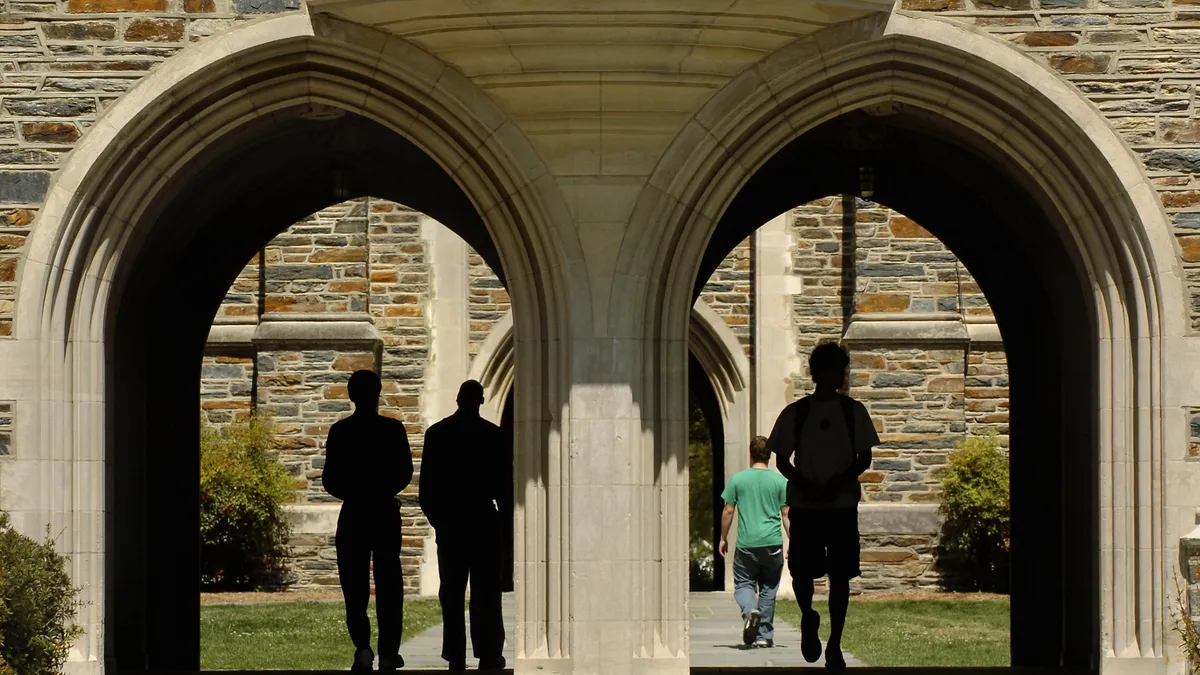Dive Brief:
-
Duke University reported more than 100 positive coronavirus cases in the week ending on Sunday, the majority of which were among vaccinated people, officials told a local media outlet. This makes the North Carolina university one of the first examples this academic year of an institution with a large number of vaccinated people testing positive for the virus.
-
These breakthrough infections aren't a sign that vaccines don't work, according to health experts, who continue to recommend combinations of vaccine, masking and testing mandates on campuses.
-
Duke is requiring students and employees to show proof they've been vaccinated or receive an exemption before classes start Monday. The university administered almost 9,700 tests to around 7,800 students and employees during the week ending Sunday, 111 of which were positive for the coronavirus. That represents a 1.1% positivity rate.
Dive Insight:
The highly contagious delta variant is causing coronavirus cases to surge throughout the U.S., though most new infections and hospitalizations are among unvaccinated people. In turn, colleges are reevaluating their safety measures for the fall.
While the pandemic has changed, the tools colleges should use haven't. Health experts say schools should still use the mitigation measures that they know work — including mask-wearing and coronavirus testing — as well as encourage or mandate the vaccines for people on campus.
Schools will likely see breakthrough infections on campuses, said Anita Barkin, co-chair of the American College Health Association's COVID-19 task force. ACHA recommends that colleges mandate vaccines for all students on campus for the fall where state law and resources allow.
Stanford University said seven fully vaccinated students came down with symptomatic COVID-19 in July. A month later, the school said it will require all students to be tested regularly for the coronavirus regardless of their vaccination status.
Boston and Northeastern universities similarly announced in July they will periodically test students even if they were fully vaccinated.
Barkin stressed that breakthrough infections don't mean the vaccines aren't working.
The risk of contracting the coronavirus is eight times higher for unvaccinated people than it is for those who've gotten the shots, according to documents from the Centers for Disease Control and Prevention. Their risk of hospitalization or death is 25 times higher.
Fully vaccinated people only make up between 0.1% to 5% of those hospitalized with the coronavirus in states that track such data, The New York Times reported.
"It's not a surprise that we're seeing breakthrough infections," said Gerald Parker Jr., associate dean for Global One Health at Texas A&M University's veterinary medicine and biomedical sciences college. "Most of them, at least to date, are associated with mild disease and not severe disease."
Even among vaccinated populations, periodic testing will be an important tool for colleges this fall, Barkin said. She applauded Duke for both requiring the vaccine and having a "strong testing strategy." The university is testing all incoming students for the coronavirus and conducting weekly tests for students and employees.
Wastewater testing could also help, Parker said. The University of California, San Diego, has been screening wastewater for the coronavirus since the summer of 2020, enabling early detection of 85% of COVID-19 cases on campus, researchers recently found.
However, some colleges won't be able to implement safety measures such as vaccine and mask mandates due to state policies. That includes Texas, where the governor signed an executive order barring both of those coronavirus countermeasures by colleges and other public entities.
Health experts stressed that those colleges should focus on encouraging students to get the shots.
"We need to have just a reasoned discussion about the importance of vaccines and keep it out of the political domain," Parker said.














